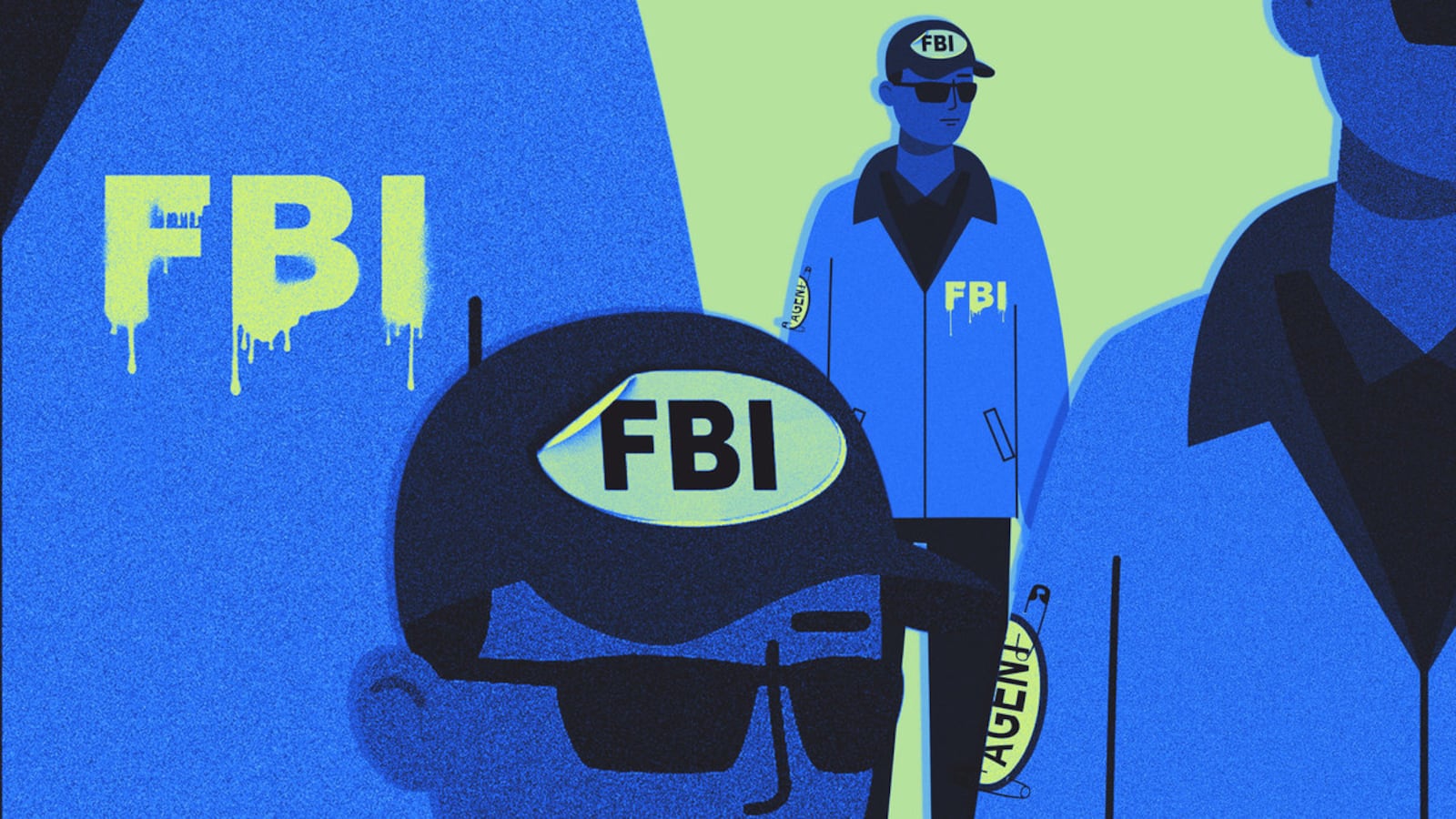A young congressional staffer for Rep. Brad Schneider (D-IL) was quietly fired last year after he faked being an FBI agent and led cops on a chase through the capital, resulting in a weeks-long nationwide manhunt.
It took four different law enforcement agencies three months to eventually catch up with the staffer 500 miles away. And it was only after a Secret Service agent managed to track down the online shops that sold the staffer mock “federal agent” gear and a bogus license plate for his fake police car—decked out with a siren and flashing lights—that authorities were able to arrest him.
The congressional staffer in question, Sterling Devion Carter, admitted in court to openly carrying a firearm illegally. Federal prosecutors dropped the law enforcement impersonation charge, and he narrowly avoided prison time. (When Carter pleaded guilty at 24, he barely made the age cutoff to take part in a local District of Columbia prison diversion program for young first-time offenders, according to his lawyer.)
That defense lawyer, Robert Lee Jenkins Jr., acknowledged to The Daily Beast that Carter lost his job because he impersonated an officer and openly carried a weapon in the District of Columbia. Jenkins said his client would not speak about the matter.
Carter’s misadventure, which has never been reported until now, started on Saturday, Nov. 14, 2020.
Two plainclothes officers with the Secret Service were busy dealing with angry, post-election MAGA protests in Washington when they spotted what looked like a police car with an odd license plate; the font seemed taller and bolder than it should be. But the rest of it looked authentic. To the untrained eye, the blue Ford Taurus would easily pass as an unmarked police cruiser. According to D.C. court documents, Carter had tricked out the otherwise boring sedan with blue emergency lights, a laptop computer mount on the front dashboard, a spotlight near the driver’s side view mirror, and even a barrier separating the front half from the back half—ready to transport detainees.

Sterling Devion Carter posed as an FBI agent and forged signatures to give himself salary increases while he was a congressional staffer.
Photo Illustration by Luis G. Rendon/The Daily Beast/Getty/FacebookCarter, who was standing near his parked car, was wearing a black T-shirt that read “federal agent,” a police duty belt, a Glock pistol, extra ammunition, handcuffs, a radio, and an earpiece. That was enough to convince passersby, who kept thanking him for his service, according to court records.
But something also seemed off about Carter. For one, he put his pistol magazines in pouches clipped behind his gun, making it practically impossible to reload the pistol in a firefight with his free hand. It was a rookie mistake and someone actually trained to shoot with a handgun would notice it, according to a person familiar with the investigation.
The closer real federal agents got to him, the more Carter moved away toward city police already on scene, this person recalled. When the agents ran the suspicious car’s plates, the results came back empty.
Shortly after noon, the agents contacted the Secret Service Joint Operations Center and asked for uniformed officers to confront this mystery man. When five bicycle cops with the Secret Service approached him, Carter simply said he was “FBI,” according to a police report. His baseball cap and facemask made it difficult to identify his face, the police report said. When they asked him for credentials, he said he didn’t have them on him, then flipped on his emergency lights and sped away. One agent pedaled as hard as he could on an electric bike through several D.C. streets, but gave up after a few blocks for “officer safety reasons,” the report says.
The subsequent investigation became a joint effort by the Capitol Police, FBI, D.C. Metropolitan Police Department, and the Secret Service. But it was a long shot by one investigator, Secret Service Special Agent A. Pascual, that actually tracked Carter down.
According to an affidavit by a fellow Secret Service agent, Pascual deduced that the unidentified suspect might have been wearing a T-shirt made by a small business in Florida, 13 Fifty Apparel.
Working off a surveillance photo of the yet-unidentified fake cop, Pascual and the business owner, a Coconut Creek police officer named Christopher Lewis, together figured out that it was probably a small or medium shirt. And they knew the shirt was relatively new, because it bore a 13FA logo on the sleeve—something the company just started doing little more than a year earlier.
According to that affidavit, Lewis gave the Secret Service agent the list of everyone who’d bought that shirt in the previous three-plus years, and Pascual narrowed down the 399 customers to the 21 people living near the nation’s capital. Pascual and an unnamed investigative analyst at the Secret Service then ran all 21 people through law enforcement databases and narrowed it down “based on photos, race, and other demographic information.” Only one, a man by the name of Sterling Carter, seemed to match the description from officers who had encountered him that day: Black, roughly 150 pounds, and 25-30 years old.
The law enforcement affidavit filed in local D.C. court claims that Pascual also arrived at Carter’s identity a second way: by reaching out to a website that makes custom license plates.
According to the affidavit, Pascual somehow figured out that the mystery fake cop bought his counterfeit plate at SignsAndTagsOnline.com. When Pascual gave them the replica D.C. tag number, a customer service representative turned over an invoice. Once again, it was Sterling Carter.
But it wasn’t until three weeks after the police chase that the Secret Service discovered that Carter was an actively credentialed congressional staffer with security access across the Capitol building—while simultaneously being a wanted fugitive.
His neighbors told federal agents they’d seen Carter dress up like law enforcement before, openly carrying his firearm—which is illegal in the District of Columbia for anyone other than police—and they remembered Carter referring to his fake police car as his “work vehicle.”
Secret Service agents with a search warrant broke into Carter’s home on New Year’s Day 2021, where an affidavit says they found his Glock 19 pistol, the extra magazines, ammunition, and even the receipt for the police car siren.
He was arrested weeks later in Georgia, his parents’ home state. He then spent 81 days in jails across Georgia, Oklahoma and the District of Columbia.
Faced with The Daily Beast’s questions this week, Rep. Schneider’s office did not explain why it made no public mention of the incident at the time.
When the congressman’s office was made aware about Carter’s impersonation of an officer, it gave Carter the option to resign or be fired, according to an officer’s sworn statement. Carter, who was still on the run in Georgia, called Schneider’s office from his personal cellphone and chose to resign—but still kept his government-issued phone, according to those police records.
However, that initial investigation opened a can of worms that did eventually go public. Schneider’s office discovered that Carter, who as operations manager oversaw congressional staff pay, had given himself an $80,000 raise.
Starting in November 2019, just three months into his new job on the hill, Carter had been routinely filling out payroll authorization forms and faking the signature of Schneider’s chief of staff to bump up his monthly salary, according to an FBI affidavit.
When Carter was criminally charged in February 2022, Schneider’s office said the staffer had been fired and that “the office is determined to pursue justice for American taxpayers, repayment for the loss to the US Treasury, and to make right by the US Congress.” He pleaded guilty to that crime too.
Last week, U.S. District Judge Carl J. Nichols sentenced Carter to nine months in federal prison for the theft of public funds. As of this week, Carter is still out and will soon turn himself in to start his sentence, according to his defense lawyer.
In a court memo, federal prosecutors criticized Carter for betraying the public’s trust.
“Instead of taking this responsibility seriously, the defendant decided to selfishly use that responsibility to illegally enrich himself, including using his ill-gotten gains to further his other crimes including through the purchase of a vehicle and a federal firearms license,” assistant U.S. attorneys Molly Gaston and Nicole Lockhart wrote.
Carter, who could not be reached for comment on this story, appears to have gone dark online. He made his last public Facebook post during the violent attack on the Capitol on Jan. 6, 2021. Friends who knew he worked in Congress wished him well and asked him to stay safe. Carter, who was still on the run at the time, thanked the same law enforcement agencies that were at that very moment trying to hunt him down.
“I want to thank Capitol Police, Secret Service, MPD, and all the other law enforcement agencies for keeping my colleagues safe!” he wrote. “WE ARE BETTER THAN THIS!”










